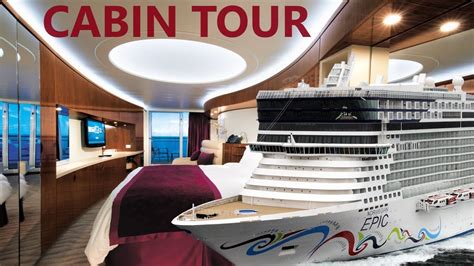
A mother and daughter were left stranded in the Bahamas after the Norwegian Epic cruise ship departed Nassau nearly an hour ahead of its scheduled departure time, leaving them scrambling to find alternative transportation back to the United States.
Jamie Salusky and her daughter, Brooke, experienced a travel nightmare when the Norwegian Epic set sail from Nassau at approximately 2:15 p.m. on Tuesday, March 19, instead of the advertised 3:00 p.m. departure time. According to Salusky, this unexpected early departure left them on the pier, watching their cruise ship sail away without them.
Salusky recounts that she and her daughter arrived back at the port at 2:07 p.m., well before the initially scheduled departure time, but they were shocked to see the ship already leaving. “We saw the ship pulling away. We were banging on the doors, but they wouldn’t let us in,” Salusky told Yahoo Lifestyle.
The incident has sparked outrage and frustration, raising questions about cruise line accountability and passenger rights. Norwegian Cruise Line (NCL) has not yet issued a public statement addressing the specific circumstances surrounding the incident but has reportedly been in contact with the Salusky family to resolve the matter.
The Unforeseen Turn of Events
The Salusky’s cruise, intended as a relaxing getaway, took a drastic turn when they returned to the port in Nassau after a day of exploring the island. They had been diligent about keeping track of time, ensuring they would be back well before the 3:00 p.m. departure listed on their itinerary. However, upon arrival, they were met with the disheartening sight of the Norwegian Epic already underway.
“We were devastated,” Salusky explained. “We had planned this trip for months, and to see the ship leaving without us was just unbelievable.”
Immediate Aftermath and Attempts to Reboard
In a state of panic, Salusky and her daughter attempted to alert the port authorities and cruise line personnel to their predicament. They frantically banged on the doors and tried to get the attention of anyone who could help, but their efforts were futile. The ship continued to sail away, leaving them stranded on the pier.
The sudden and unexpected departure left the Saluskys with limited options. They were forced to find alternative accommodations in Nassau and arrange for a flight back to the United States at their own expense. This unforeseen expense and the emotional distress caused by the incident compounded their frustration.
Norwegian Cruise Line’s Response
As of now, Norwegian Cruise Line has not issued a formal public statement regarding the incident involving the Salusky family. However, according to Salusky, they have been in contact with her to discuss the situation and explore possible resolutions. The details of these discussions have not been disclosed.
“We are hoping that Norwegian Cruise Line will take responsibility for their mistake and compensate us for the expenses we incurred as a result of their early departure,” Salusky said. “More importantly, we want to ensure that this doesn’t happen to anyone else in the future.”
Cruise industry experts suggest that the early departure may have been due to a number of factors, including unforeseen operational issues or a miscommunication between the ship’s crew and port authorities. However, they emphasize that it is the cruise line’s responsibility to ensure that all passengers are accounted for before setting sail.
Passenger Rights and Cruise Line Accountability
The incident involving the Salusky family has reignited the debate about passenger rights and cruise line accountability. Cruise contracts often contain clauses that limit the cruise line’s liability in certain situations, but passengers are generally entitled to expect that the cruise line will adhere to the advertised itinerary and ensure their safe and timely return.
Consumer advocacy groups argue that cruise lines should be held to a higher standard of care and that passengers should have clear and accessible channels for resolving disputes. They also emphasize the importance of passengers carefully reviewing their cruise contracts and understanding their rights and responsibilities.
Potential Legal Recourse
Given the circumstances, the Salusky family may have grounds to pursue legal action against Norwegian Cruise Line. A maritime lawyer specializing in cruise ship incidents could advise them on their legal options and help them navigate the complex legal landscape. Potential claims could include breach of contract, negligence, and misrepresentation.
However, pursuing legal action against a cruise line can be a challenging and time-consuming process. Cruise contracts often contain clauses that require disputes to be resolved through arbitration rather than litigation, and they may also limit the amount of damages that can be recovered.
Impact on Cruise Industry Reputation
Incidents like this can have a negative impact on the cruise industry’s reputation. Cruise lines rely on positive word-of-mouth and repeat customers to maintain their business, and stories of passengers being stranded or mistreated can deter potential travelers. Cruise lines need to prioritize passenger safety and satisfaction to maintain their credibility and ensure the long-term health of the industry.
Expert Commentary and Analysis
Cruise industry analyst Stewart Chiron, known as “The Cruise Guy,” commented that such incidents, while rare, underscore the importance of passengers confirming departure times and staying informed of any changes. He emphasized that passengers should always double-check the onboard communication channels and consult with cruise staff if they have any doubts.
“While cruise lines generally strive to provide a seamless and enjoyable experience, unforeseen circumstances can sometimes arise,” Chiron noted. “Passengers need to be proactive in protecting their interests and ensuring that they are aware of any potential disruptions.”
The Importance of Travel Insurance
This situation highlights the importance of purchasing comprehensive travel insurance when taking a cruise. Travel insurance can provide coverage for unexpected events such as missed departures, lost luggage, medical emergencies, and trip cancellations. While it cannot prevent such incidents from occurring, it can help mitigate the financial consequences and provide peace of mind.
Lessons Learned and Recommendations
The Norwegian Epic incident serves as a cautionary tale for cruise passengers, highlighting the importance of:
- Confirming Departure Times: Always double-check the scheduled departure time with cruise staff and onboard communication channels.
- Staying Informed: Be aware of any potential changes to the itinerary or departure time.
- Arriving Early: Plan to arrive at the port well in advance of the scheduled departure time.
- Purchasing Travel Insurance: Protect yourself against unexpected events with comprehensive travel insurance.
- Understanding Your Rights: Familiarize yourself with the terms and conditions of your cruise contract and understand your rights as a passenger.
By taking these precautions, passengers can minimize the risk of encountering similar issues and ensure a more enjoyable and stress-free cruise experience.
Norwegian Cruise Line’s Past Issues
Norwegian Cruise Line has faced scrutiny over passenger incidents in the past. Although precise figures on passenger stranding events are not publicly available, anecdotal evidence and media reports suggest that such occurrences, while infrequent, are not entirely isolated incidents across the industry. In 2022, the Norwegian Prima made headlines when passengers complained about unsanitary conditions and a lack of basic amenities. Similar issues have been raised in the past concerning other ships in the NCL fleet, particularly regarding service quality and communication failures during onboard emergencies or itinerary changes. These past incidents, while distinct from the present case, underscore the importance of scrutinizing cruise line accountability and operational transparency.
The Broader Context of Cruise Ship Departures
The logistics of cruise ship departures are complex, involving coordination between the ship’s crew, port authorities, customs and immigration officials, and various service providers. A number of factors can influence the timing of a departure, including weather conditions, tides, security concerns, and the availability of port facilities. Cruise lines typically build a buffer into their schedules to account for potential delays, but unforeseen circumstances can sometimes lead to adjustments.
Cruise lines also have strict protocols in place for accounting for passengers before departure. These protocols typically involve multiple checks and confirmations to ensure that everyone is onboard. However, human error can sometimes occur, and passengers can be inadvertently left behind.
The Role of Technology in Passenger Management
Cruise lines are increasingly relying on technology to improve passenger management and prevent incidents like the one involving the Salusky family. Facial recognition technology, electronic boarding passes, and real-time tracking systems are being implemented to enhance security and streamline the boarding process. These technologies can help cruise lines quickly identify missing passengers and ensure that everyone is accounted for before departure.
However, technology is not a panacea, and it is essential to have robust backup systems in place to address potential failures. Human oversight and communication remain critical components of effective passenger management.
The Future of Cruise Travel
The cruise industry is constantly evolving, with new ships, itineraries, and technologies being introduced every year. Cruise lines are also facing increasing pressure to improve their environmental performance and reduce their carbon footprint. The future of cruise travel will likely involve a greater emphasis on sustainability, innovation, and passenger experience.
As the industry continues to grow and adapt, it is essential that cruise lines prioritize passenger safety and satisfaction. By investing in improved technology, training, and communication, they can minimize the risk of incidents like the Norwegian Epic stranding and ensure that cruise travel remains a safe and enjoyable option for millions of people around the world.
Detailed Analysis of the Potential Reasons Behind the Early Departure
Several potential factors could have contributed to the Norwegian Epic’s early departure. While Norwegian Cruise Line has not provided a specific explanation, industry experts and seasoned cruisers offer insights into possible causes:
-
Port Congestion and Scheduling Conflicts: Ports like Nassau are often bustling hubs with multiple cruise ships arriving and departing throughout the day. If the Norwegian Epic was facing a potential conflict with another vessel vying for the same departure slot or resources, port authorities might have requested an earlier departure. This is especially plausible if there were delays earlier in the day that rippled through the schedule.
-
Tidal Conditions and Navigational Constraints: The depth of the harbor and the width of navigational channels can be heavily influenced by tidal changes. If the Epic, a large ship, required a specific tide level to safely navigate out of the port, an earlier departure might have been necessary to coincide with favorable tidal conditions. This would be particularly relevant if forecasts predicted an unfavorable low tide later in the afternoon.
-
Unforeseen Mechanical Issues or Repairs: While less likely without prior notice, a minor mechanical issue that required immediate attention could have prompted the captain to adjust the schedule. If, for instance, a minor repair was completed quicker than anticipated, the ship might have opted to depart earlier to avoid potential delays further down the itinerary. However, standard procedure would dictate advising all passengers.
-
Security Concerns or Emergency Situations: Though unlikely without further information, a security threat or emergency situation ashore could have prompted an expedited departure. If local authorities advised the ship to leave as quickly as possible due to unrest or a security incident, the captain might have prioritized the safety of the passengers and crew by departing earlier. This scenario typically involves widespread announcements and a clear explanation to passengers.
-
Communication Breakdown: Perhaps the most plausible explanation given the available information is a breakdown in communication between the ship’s crew, port authorities, and the onshore personnel responsible for passenger check-in. A miscommunication regarding the revised departure time could have led to the ship departing before all passengers were accounted for. This emphasizes the importance of clear and consistent communication protocols.
-
Disciplinary Action (Less Likely): In extremely rare cases, a captain might choose to depart early due to passenger behavior or a disciplinary issue onboard. However, this would be an extreme measure and would typically involve specific protocols and documentation. Given the absence of any reports indicating unruly passenger behavior, this scenario is highly improbable.
Comparative Analysis of Cruise Line Responsibilities and Passenger Rights
The Norwegian Epic incident underscores the delicate balance between cruise line responsibilities and passenger rights. While cruise contracts often contain clauses that limit liability, cruise lines have a fundamental duty to provide a safe, enjoyable, and reasonably predictable travel experience.
Here’s a comparative breakdown:
-
Cruise Line Responsibilities:
- Adherence to Itinerary: Cruise lines are generally obligated to adhere to the advertised itinerary and schedule, barring unforeseen circumstances like weather or mechanical issues. Significant deviations from the itinerary should be communicated to passengers promptly.
- Passenger Safety: The safety and well-being of passengers are paramount. This includes providing adequate security, medical facilities, and emergency procedures.
- Accurate Information: Cruise lines must provide accurate and timely information about departure times, port procedures, and any potential disruptions to the cruise.
- Reasonable Care: Cruise lines are expected to exercise reasonable care in ensuring the safety and comfort of their passengers. This includes providing adequate food, accommodation, and entertainment.
-
Passenger Rights:
- Right to Information: Passengers have the right to be informed about any changes to the itinerary, schedule, or other aspects of the cruise.
- Right to Safe Passage: Passengers have the right to expect that the cruise line will take reasonable steps to ensure their safety and security.
- Right to Compensation: In certain circumstances, passengers may be entitled to compensation for damages or losses resulting from the cruise line’s negligence or breach of contract.
- Right to Complain: Passengers have the right to complain about issues or problems they encounter during the cruise.
Examining the Fine Print: Understanding Cruise Contracts
Cruise contracts, often referred to as “tickets,” are legally binding agreements that govern the relationship between the cruise line and the passenger. These contracts typically contain numerous clauses that limit the cruise line’s liability and define the passenger’s rights and responsibilities.
Key clauses to be aware of:
- Limitation of Liability: These clauses limit the amount of damages the cruise line will pay in the event of an injury, illness, or other loss. They often specify that the cruise line is not liable for acts of God, acts of war, or other events beyond its control.
- Forum Selection Clause: This clause specifies the jurisdiction in which any disputes between the cruise line and the passenger must be resolved. This is often a location that is favorable to the cruise line.
- Arbitration Clause: This clause requires that any disputes be resolved through arbitration rather than litigation. Arbitration is a process in which a neutral third party hears both sides of the case and makes a binding decision.
- Time Limits for Filing Claims: Cruise contracts typically impose strict time limits for filing claims. Passengers who fail to file a claim within the specified time frame may lose their right to sue the cruise line.
- Changes to Itinerary: These clauses allow the cruise line to change the itinerary at any time, without prior notice, due to weather, mechanical issues, or other unforeseen circumstances.
The Psychological Impact of Being Stranded
Beyond the financial implications, being stranded in a foreign country can have a significant psychological impact on individuals. The feeling of helplessness, vulnerability, and isolation can be overwhelming. Passengers may experience anxiety, stress, and fear for their safety and well-being. The disruption to travel plans and the uncertainty about the future can also contribute to emotional distress. The event can tarnish what was meant to be a holiday and create lasting negative memories.
FAQ: Frequently Asked Questions
-
What happened to the mother and daughter on the Norwegian Epic? Jamie Salusky and her daughter, Brooke, were left in Nassau, Bahamas, after the Norwegian Epic cruise ship departed nearly an hour earlier than the scheduled 3:00 p.m. departure time on Tuesday, March 19.
-
Why did the ship leave early? The exact reason for the early departure is currently unclear. Norwegian Cruise Line has not yet released a public statement but has contacted the family. Potential reasons include port congestion, tidal conditions, mechanical issues, security concerns, or a communication breakdown.
-
What are the Saluskys doing now? They had to find alternative accommodations in Nassau and arrange for a flight back to the United States at their own expense. They are seeking compensation from Norwegian Cruise Line for the expenses and distress caused by the incident.
-
What should passengers do to prevent this from happening to them? Passengers should always confirm departure times with cruise staff, stay informed of any potential changes, arrive at the port well in advance of the scheduled departure time, purchase comprehensive travel insurance, and understand their rights as a passenger.
-
What legal recourse do the Saluskys have? They may have grounds to pursue legal action against Norwegian Cruise Line for breach of contract, negligence, and misrepresentation. A maritime lawyer specializing in cruise ship incidents can advise them on their legal options.









